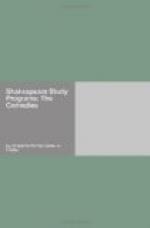Until a few years ago no one had succeeded in finding the Play or Novel on which the European part of the plot of “The Tempest” was founded.
An early German Play, “The Fair Sidea” had been brought forward on account of some resemblances to “The Tempest.” Yet it is obviously not its source but rather an imitation or variant indirectly drawn from a similar foundation story.
Edmund Dorer, a special student of Spanish Literature first called attention (Jan. 31, 1885,) to the story more closely resembling “The Tempest” than any other, as it occurs in a collection of tales by Antonio de Eslava, called Las Noches de Invierno, or “Winter Nights,” published in Madrid in 1609.
Like other such collections of stories, such as the Italian collection of Bandello, and the French of Belleforest, used by Shakespeare, Eslava’s collection was translated, and, in default of the original from one of the later editions, as translated into German in 1683 (Noches de Invierno Winternachte aus dem Spanischen in die Deutsche sprach versetzet) a summary of this story was given in English for the first time as a satisfactory source of “The Tempest” in the “First Folio Edition” of the Play (see pp. 85-93 and Introduction; also for an extract and summary of “The Fair Sidea,” pp. 94-95).
What may be called the American half of the plot evidently owes suggestions to pamphlet accounts of the storm and wreck and other experiences met with by Sir Thomas Gates, Sir George Sommers and others during their voyage of discovery to the Bermudas in 1610 (see pp. 92, 99, and Notes pp. 114, 125-127, etc., for extracts.)
Gonzalo’s speech, too, follows pretty closely a passage in Florio’s Montaigue. (For this passage see Note on II. i. 153-160).
ACT I
THE SCHEMES OF PROSPERO.
The first scene shows the storm in progress. Is there any clew given to the reader that it is a magic tempest? What is Prospero’s main object in having the ship’s crew and passengers cast upon his island? Is it to wreak vengeance on his enemies, to work the charm of love between Ferdinand and Miranda, or by means of that to reinstate himself? In what way would this love work to his advantage? Notice the natural way in which the reader is put in possession of the necessary information about the past of Prospero and Miranda. Warburton says of this that it is the finest example he knows of retrospective narration for the sake of informing the audience of the plot. How much of the plot is permitted to come out in this act? Why does Prospero so repeatedly urge Miranda’s attention? Is she abstracted, is he, or is she already beginning to be drowsy? Why was Ferdinand the first to quit the ship? Since Prospero already knows, why does he ask Ariel what time it is?




